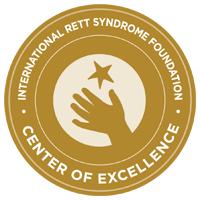If your child was recently diagnosed with Rett syndrome, you probably have questions about what comes next. This resource can help you and your family as you adjust to the diagnosis and learn how to support your child.

First Steps After a Rett Syndrome Diagnosis
Awards & recognition
-

Ranked among the nation's best in 11 specialties
-

One of the nation's best for neurology & neurosurgery
-

Designated a Center of Excellence for Rett syndrome
Build a Rett syndrome care team
While there's no cure for Rett syndrome, getting the right care can help patients and their families enjoy a better quality of life. Your child's treatments should be tailored to their symptoms and any associated health conditions they have. Your child will also need regular monitoring for scoliosis and heart problems.
Complete care will likely require doctors from different specialties, including:
- Developmental-behavioral pediatrics
- Pediatric neurology
- Medical genetics
- Pediatric cardiology
- Pediatric gastroenterology
Children with Rett syndrome also benefit from other types of health care services, such as:
- Occupational therapy to improve hand function; reduce repetitive hand movements; and work on daily living skills, such as eating and getting dressed
- Physical therapy and hydrotherapy to improve mobility and balance
- Speech-language therapy to learn nonverbal ways to communicate and skills to improve social interaction
- Nutrition counseling to help your child achieve an adequate weight and strengthen their bones
The Rett Syndrome Clinic at UCSF Benioff Children's Hospitals has been designated a center of excellence by the International Rett Syndrome Foundation for offering the best possible care for the condition.
Support your child's development and education
If your child is younger than 3: Explore early intervention services.
Children younger than 3 years old are eligible for early intervention services through their state's health department. These services include free or low-cost speech therapy, physical therapy, and other services to support your child's development and set them up for success at school.
For more information about early intervention services (including early intervention contacts for your state), visit the Centers for Disease Control and Prevention's website.
If your child is 3 or older: Explore special education services.
If your child is 3 or older, contact your local elementary school to request an evaluation for special education services. (Your child doesn't need to attend the school.) These free services are available to preschool- and school-age children, and the process is tailored to each child's educational and developmental needs.
Your child's evaluation report and recommended services will be formalized in an individual education plan (IEP). More information on IEPs is available from GreatSchools.
Organize medical information
Managing a chronic health condition takes effort, patience and time. A little bit of organization can make it easier.
To start, decide on a single location for storing all your child's medical documents. You might choose a physical binder with tabs or an online system of shared virtual folders. Whatever you use, include the following:
- Reports of your child's medical tests and evaluations
- Prescriptions for medications or medical equipment
- Contact information for all your child's health care providers
- Immunization records
- Insurance information
- Model and serial numbers, receipts and vendor information for medical equipment (so you know who to contact if something breaks)
- Your child's individualized family support plan (if your child has received early intervention services) and individualized education plan (for special education services)
- Logs for tracking behaviors, developmental milestone gains or losses, and symptoms
To help others who are caring for your child, consider creating a separate binder with useful information, such as your child's daily schedule and sleep routine, feeding details, likes and dislikes, and emergency contacts.
Build a community of support
It's normal to feel a range of emotions after a Rett syndrome diagnosis. Remember that you are not alone. If you wish to connect with other families of newly diagnosed children, visit the International Rett Syndrome Foundation's website.
Be honest with your friends and extended family about what your family is going through and share what you, your child and your family need. Having the support of loved ones can help prevent burnout.
In addition to family and friends, contact your local fire and police departments and let them know you have a child who may need special assistance in an emergency. Many departments maintain a special needs registry for this reason.
If your child uses electrically powered medical equipment, contact your utility provider to ask about its Medical Baseline Allowance Program. This can help lower your utility bill.
Finally, remember that your child's health care team is part of your support system. Talk with your child's providers about any concerns you have and to get connected with helpful resources.
This information is for educational purposes only and is not intended to replace the advice of your child's doctor or other health care provider. We encourage you to discuss any questions or concerns you may have with your child's provider.
Tender wagging care
Our therapy dogs spread joy and smiles at the bedside and throughout the hospital.
Visit Child Life services




























